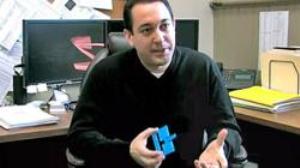Dr. David Cappelleri, Stevens Institute of Technology’s assistant professor of Mechanical Engineering has won the prestigious CAREER Award from National Science Foundation (NSF). Being one of the most enthusiastic programs conducted by the NSF, the CAREER Award supports the faculty’s initial career development in sciences, thereby motivating them to be researchers and professors in future.
 Dr. David Cappelleri Receives NSF CAREER Award for Ground-Breaking Work in Microrobotics
Dr. David Cappelleri Receives NSF CAREER Award for Ground-Breaking Work in Microrobotics
Microrobots enable the detection of cancer cells leading to improved microsurgical applications. Cappelleri’s microscale robots signify a new standard in sophistication. These microrobots are magnetically controlled and equipped with a probe that functions as a micro-force sensor. Deformations result in the probe due to its contact with cells and tissues under a microscope. Measurement of deformations is achieved by camera system. Based on the probe’s familiar properties, researchers can typify the cells or tissues.
The design of the micro-force sensor is similar to the conventional suspension mechanisms in silicon wafers- based resonators and accelerometers. The silicon material has been replaced with a much more compliant polydimethylsiloxane (PDMS) material by these force sensors. Researchers can therefore calculate micro-Newton forces at the degree of a biological cell with a diameter of multiple microns.
The micro-force sensors can be used to differentiate between healthy and cancerous cells. The flexibility and safety of advanced bone implants will be enhanced by the sensor technology. Some surface coatings increase adhesion of new cell and tissue growth enclosing an implant, thereby reducing the adhesion of other infectious biomaterials.
The coatings and surface properties can be analyzed using Cappelleri’s microrobots. In addition, specific reactions with the microbots yield positive cell reactions favoring direct cell growth. In the forthcoming years, advancements in robots will enable several microsurgical applications such as targeted drug delivery and clearing blood clots or arteries and many more.